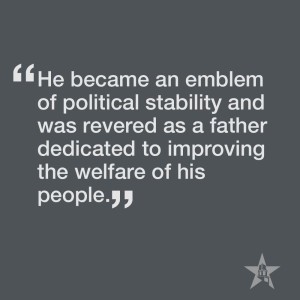When we think of strong, influential leaders in the world, the King of Thailand isn’t exactly the first person to come to mind. While our own election season rages on as a torrent of bad taste and heated tempers, Westerners might have a few things to learn from Thailand’s late king.

King Bhumibol Adulyadej of Thailand died last Thursday, October 13, ending a reign that lasted over 70 years. When he first came into power in 1946, King Bhumibol spent his first years composing and playing jazz over the radio, sponsoring charities and farms, and making public appearances with his charismatic and attractive family. By doing these things, the king was strategically building up a relationship with the people of his country. Because he cared so much for them, he became one of them.
A ruler so devoted to the governed that he seeks to become one of them is a rare form of leadership. Over the course of his reign, the king set up over 1,200 development programs all over the country to help those living in the most poverty-stricken circumstances. He visited villages and conversed with the ethnic hill tribes that are considered the lowest on the social hierarchy. He became an emblem of political stability and revered as a father dedicated to improving the welfare of his people.
The passing of the late king will usher in a year long mourning period in which the people of Thailand, ranging from all ages and ethnicities, are weeping over the death of a monarch who had the power to turn their lives into hell, but chose not to. He loved, cared for, and nurtured them even though his position was inherited, not elected. He was not bound by a democratic rule of law that we deem so necessary for an effective leader, and yet he left behind a legacy of stability and a thriving nation. How?
When it comes to approaching politics and the makeup of a good leader, we need to rewire the way we theorize politics and democracy and understand that maybe there’s something deeper, something more inherent that we just aren’t getting at.
 What would it look like if our political leaders cared as much about the people they’re serving as King Bhumibol did his own people? What kind of nation would we be if we revered and respected our political leaders the way Thais feel about their late king? I find it ironic that as a world power, the U.S. is trailing far behind countries that value character, honor, and dignity rather than becoming consumed by our entitlement complexes.
What would it look like if our political leaders cared as much about the people they’re serving as King Bhumibol did his own people? What kind of nation would we be if we revered and respected our political leaders the way Thais feel about their late king? I find it ironic that as a world power, the U.S. is trailing far behind countries that value character, honor, and dignity rather than becoming consumed by our entitlement complexes.
As Americans we pride ourselves for living in a country where our rights are protected by a political system set up almost 250 years ago. We have the right to vote and therefore control, to some degree, who we put into office. Under this system, we should feel some sort of positive emotional attachment to our political leaders since we had a direct impact on their being in office. Instead, we become angry and relentlessly unforgiving when our leaders fail to live up to our idealized standards. We crucify them as corrupt and self-serving who are no longer fit to hold public office.
When it comes to choosing a leader, I’m more concerned with character than their stance on an issue. Perhaps this is naive, but honor, respect, and humility speak louder than multi-billion dollar corporations and an impressive 30 year resume of public service. In the midst of this stressful election season, with both major party candidates constantly at each other’s throats, King Bhumibol serves as a sobering reminder of what quiet yet deliberate leadership looks like.
Bekah is a senior with majors in international development and political science.
